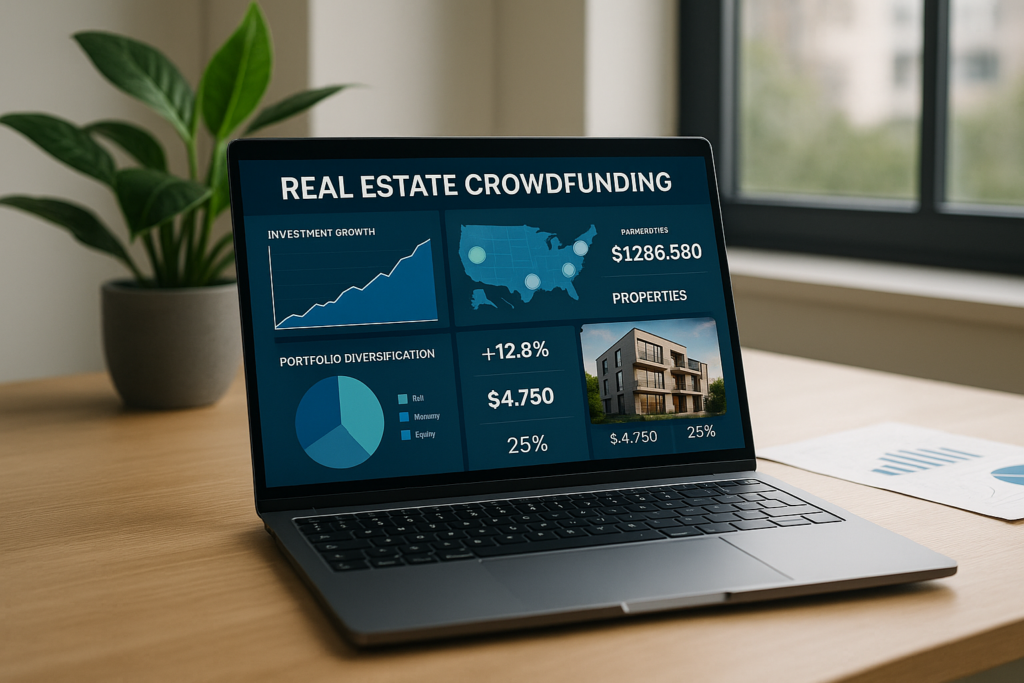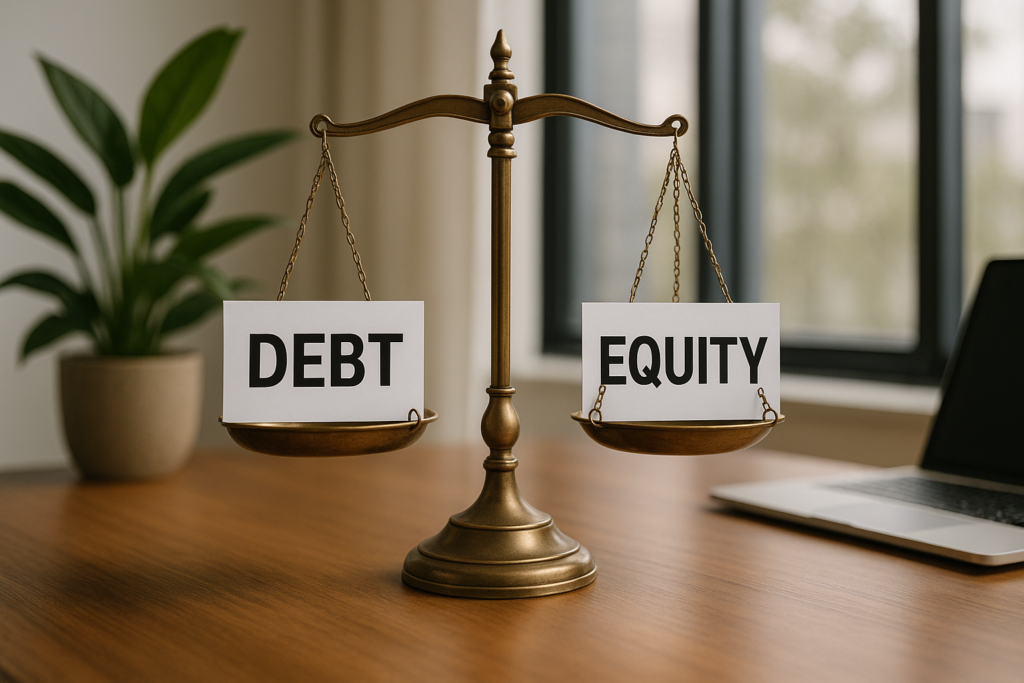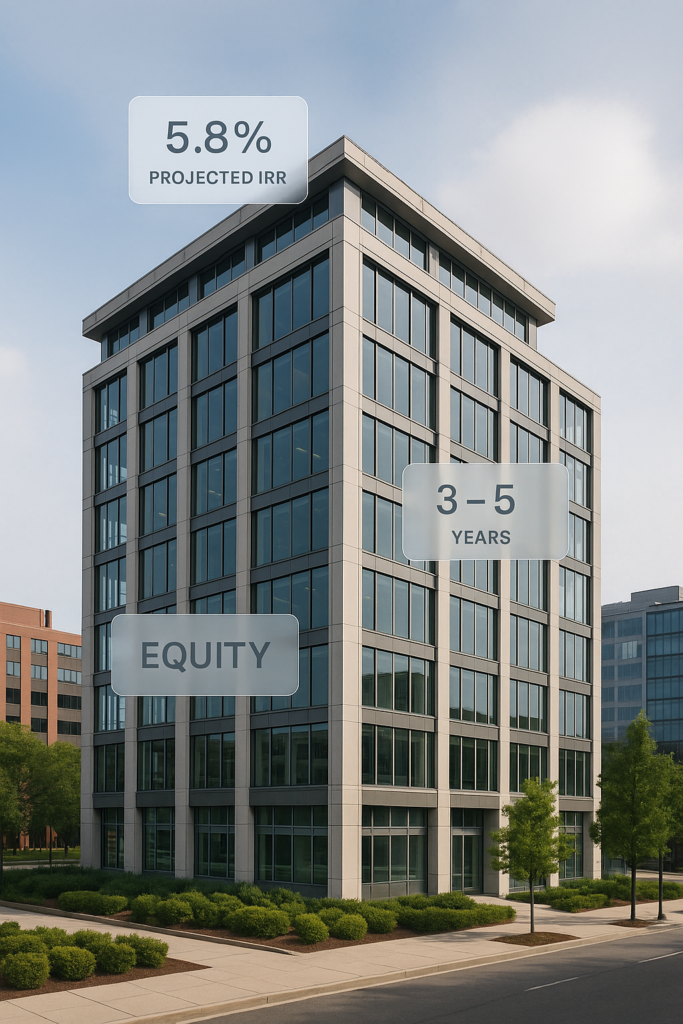Real Estate Crowdfunding Platforms: The Hidden Wealth Strategy For Investors

Today’s smartest agents and investors are quietly building wealth through real estate crowdfunding platforms, and the shift is reshaping the entire investment conversation.
For many years, real estate was dominated by two pathways: either you bought a rental property the traditional way, or you saved until you could. That limited who could participate, and how fast portfolios could grow. However, the landscape has changed in recent times.
It’s a structural evolution built around access, diversification, and smarter capital allocation. The people who understand it early are already seeing the biggest upside.
The real estate game has changed. While most people are still stuck fighting over overpriced rental properties and dealing with 2 AM tenant calls, a growing group of investors has discovered something better.
Real estate crowdfunding platforms are quietly reshaping how people build wealth through property. Through actual access to deals that were impossible to reach just a decade ago.
This guide is the strategic playbook for maximizing returns and minimizing risk through real estate crowdfunding platforms.
Below is a clear look at how these platforms work, the crowdfunding pros and cons, and why this model integrates perfectly with strategies like rental properties for passive income and debt vs equity investing.
Here’s what you need to know before everyone else catches on.
Why Real Estate Crowdfunding Platforms Are Pulling Serious Investor Attention
Firstly, these platforms allow investors to participate in real estate projects without having to buy an entire property themselves. Instead of taking on a large mortgage, managing repairs, or chasing tenants, an investor can place capital into professionally managed deals that match their risk and return goals.
For agents, this represents a new lane of opportunity. Clients who aren’t ready to buy a rental property outright may still be eager to invest, and they turn to trusted professionals for guidance, and deal evaluation insight.
The real benefit is that crowdfunding brings institutional grade deals to regular investors without requiring six figure down payments. That’s one of the wealth building strategies everyone missed until now.
What Real Estate Crowdfunding Platforms Actually Do
Think of these platforms as the middleman you actually want in your life. They pool money from multiple investors to fund real estate projects such as commercial buildings, apartment complexes, and development deals that would normally require millions in capital.
Crowdfunding platforms are basically the digital gatekeepers to real estate deals. They eliminate two major costs for you: 1. the hassle of property management, and 2. the need for massive initial capital.
Instead of needing $2 million to buy an apartment building, you can invest $5,000 and own a piece of it. The platform handles everything from finding deals, vetting properties, managing paperwork, and distributing returns.
It’s just technology meeting real estate in a way that makes sense for everyone.
Understanding Crowdfunding Pros and Cons
Like any investment method, there’s nuance. To outperform the market, you must treat crowdfunding as a permanent capital allocation, and understand its challenges.
Pros
- Lower capital requirements: You can start with a lot less capital than traditional real estate requires. Most platforms have minimums between $500 and $5,000 instead of six figure down payments.
- Instant Diversification Across Markets: Instead of being exposed to a single local market, you can spread $10,000 across ten different assets (multi family, industrial, commercial debt) in diverse geographic regions, mitigating single asset risk. Diversification becomes actually achievable. Instead of putting all your money into one rental property in one city. Therefore, one tenant leaving doesn’t tank your entire investment.
- True Passivity: This is the purest form of rental properties for passive income there is. The platform and sponsor handle every operational detail, from tenant screening to disposition. Your role is purely the capital your willing to commit.
- Professional management teams: are built in. Teams of experienced operators handle the complex work while you benefit from their expertise.
- No direct tenant, repair, or maintenance responsibilities.
- Inflation Hedge: Real estate investments often outperform the stock market in terms of real returns over the long term.
- You gain access to quality deals: The same apartment complexes and commercial properties that pension funds and REITs invest in are now available to you.
Cons
- Less control than owning a rental outright. You can’t tour the property, choose the tenants, or influence management decisions. You’re trusting the platform and their partners completely.
- Illiquidity is Real: This is the single biggest risk. Your money is locked up. Most investments require 3-7 year commitments. Unlike stocks, you can’t just sell tomorrow if you need cash. . While some platforms offer limited secondary markets, liquidity is not guaranteed. Be sure to only commit capital you will not need for the duration of the asset’s business plan.
- Platform quality varies.
- Returns depend on project performance, and aren’t guaranteed. Real estate markets fluctuate. Projects fail, and some platforms have better track records than others. Past performance doesn’t predict future results.
- Some offerings are limited to accredited investors.
- Fee Complexity: The fees can be vague and layered. Platforms typically charge 1-2% annually, plus various other fees depending on the deal structure. These eat into returns, especially on underperforming investments. You must look beyond the target return and find the Net IRR after accounting for platform fees, annual asset management fees, and the sponsor’s performance fee.
Real estate crowdfunding isn’t perfect, and anyone who tells you otherwise is selling something. The key is to evaluate platforms using the same metrics seasoned investors use such as deal type, fees, risk class, projected returns, the mix of debt vs equity, and how distributions work.
That’s how sophisticated investors avoid weak deals, and then lock onto the ones worth funding.
What Separates Good Platforms from Mediocre Ones
Not all real estate crowdfunding platforms are created equal. Some will make you money. Others will waste your time and capital.
Track record matters more than promises: Look for platforms that have been operating through different market cycles. How did they perform in 2020? What about during regional downturns?
Deal quality beats deal quantity. Platforms pushing dozens of new investments monthly are often prioritizing volume over vetting. The best platforms are selective, sometimes passing on 95% of potential deals.
Transparency should be non negotiable. You want detailed information about every property: location, business plan, financial projections, risk factors, and the track record of everyone involved. Vague marketing materials are a red flag.
Investor alignment reveals true intentions. Do the platform’s executives invest their own money alongside yours? Do they earn fees regardless of performance, or do they only profit when you profit? These details matter.
Debt vs Equity: The Decision That Changes Your Returns

One of the most important and most overlooked pieces of this puzzle is the choice between debt vs equity offerings.
A beginner asks, “How much can I make?” An intelligent investor asks, “What is my position in the capital stack?” Understanding Debt vs Equity is the difference between stable income and high risk/high reward speculation.
Here’s where real estate crowdfunding platforms get interesting. You’re not stuck with one investment type. Most platforms offer two approaches, and understanding the difference is critical.
Debt investments mean you’re essentially becoming the bank. You loan money for a real estate project and get paid back with interest, typically 8-12% annually. Your returns are predictable, and you get paid before equity investors. The downside is that your upside is capped. If the property doubles in value, you still only get your interest rate.
Equity investments mean you own a piece of the actual property. Returns come from rental income and appreciation when the property sells. You might see 15-20% annual returns on a successful deal, but you’re taking more risk. If the property underperforms, your returns will suffer.
Smart investors often split their portfolio between both. debt for steady income, and equity for growth potential. It’s the same strategy wealthy families have used for generations, only now it’s available to regular investors.
The following is a chart to help you break it down and understand the differences better:
| Feature | Debt Crowdfunding (Lending Model) | Equity Crowdfunding (Ownership Model) |
| Investor’s Position | Senior Position (Paid first) | Junior Position (Paid after debt holders) |
| Risk Profile | Lower. Secured by collateral (the property lien). | Higher. Bears the full risk of loss. |
| Return Profile | Fixed interest rate (e.g., 8%-12% APY). | Variable returns from rent (cash flow) + profit from sale (appreciation). |
| Monetization Strategy | Stable, short term cash flow. Great for accruing capital for larger deals. | Long term capital appreciation. Maximum return potential. |
Debt deals:
- More predictable
- Fixed returns
- Lower volatility
- Paid earlier in the capital stack
Equity deals:
- Profit participation
- Higher long term upside
- More risk
- Dependent on property performance and exit strategy
Smart investors don’t choose one permanently. They balance both based on their income goals, risk tolerance, and timeline.
Agents who understand this instantly elevate their credibility with high net worth clients and serious investors.
The bottom line is that you use debt vs equity to balance your portfolio. Use debt investments for capital preservation and short term liquidity, (often 6 months to 2 years). Use equity for long term compounding, and achieving the highest potential for rental properties for passive income.
The Rental Properties for Passive Income Alternative

Traditional rentals aren’t disappearing. In fact, many investors combine:
✔ A few traditional rentals
✔ Diversified crowdfunding investments
✔ Income generating equity deals
✔ Short term or long-term passive plays
This layered strategy smooths out risk, and increases overall returns.
Crowdfunding becomes the bridge for investors who want passive income without committing to full property ownership every time. As for agents, this creates a powerful educational angle that builds trust and positions you as more than a transaction facilitator.
Example: A typical rental property requires $50,000-$100,000 down payment. You’ll spend weeks finding the right property, negotiating, inspecting, and closing. Then comes furnishing, finding tenants, and ongoing management.
If everything goes perfectly, you might see 8-12% annual returns after expenses. But you’ve tied up massive capital in one asset, in one location, dependent on one local market.
With that same $50,000 on crowdfunding platforms, you could invest in 10 different properties across various markets and property types. Your time investment is measured in hours instead of months. Your risk is spread instead of concentrated.
Direct ownership offers more control and potentially better tax benefits. Crowdfunding offers better diversification and actual passive income.
Neither is universally better. It depends on your specific situation, skills, and goals.
The Real Estate Investment Platform Advantage
The modern investor wants clarity:
- What type of property is being funded?
- Who is managing it?
- What’s the business plan?
- What’s the projected IRR, cap rate, or hold period?
- How does the platform vet deals?
This is where real estate investment platforms shine. They curate deals, simplify analysis, and offer the transparency that investors demand.
Professionals who can explain these processes without pitching or selling become invaluable resources to their clients.
Traditional rental properties for passive income are not actually that passive.
You’re dealing with maintenance, vacancies, difficult tenants, property management fees, and the constant stress of being a landlord. Even if you hire a property manager, you’re still on the hook for major decisions and unexpected expenses.
Crowdfunding flips this model. Your involvement ends after you click “invest.” No midnight phone calls about broken water heaters. No dealing with evictions. No surprise $15,000 roof repairs.
The platform and their partners handle operations while you collect distributions. That’s the passive income most people think they’re getting with rental properties but rarely do.
Who Real Estate Crowdfunding Platforms Actually Work For
Real estate crowdfunding platforms aren’t right for everyone, but they work for a lot of investors.
This makes sense if you want real estate exposure without the landlord lifestyle. If you have capital to invest, but not enough time or desire to manage properties directly. Crowdfunding solves that problem.
It works for investors who value diversification. Instead of having all your real estate money in one property, you can spread risk across multiple projects and markets.
It’s ideal for people who want to invest in commercial real estate, but lack the large amounts of capital that are typically required for entry.
It fits investors comfortable with longer time horizons. However, if you need liquidity within months, stick with stocks or bonds.
Checklist: Making Your First Move With Real Estate Crowdfunding Platforms
If you’re considering real estate crowdfunding platforms, start small and learn.
Don’t invest money you’ll need within three years. These aren’t liquid investments, and early withdrawal options are limited or nonexistent.
Read every word of the offering documents. They are boring, but important and critical. The key risks and terms are always buried in the details.
Diversify from day one. Your first investment should never be your only investment. Spread capital across multiple deals to reduce single property risk.
Understand the fees completely. Know what you’re paying, and what you’re getting for those fees. Some platforms offer better value than others.
Start with debt investments if you’re risk averse. The returns are lower but more predictable, giving you time to learn how these platforms operate before taking on equity risk.
Final Thoughts: The Wealth Strategy Shift Is Already Here

Real estate crowdfunding platforms aren’t replacing traditional real estate. They’re expanding the opportunities. Investors are using them to diversify. Agents are using them to educate clients. And together, they’re shaping a smarter, more accessible pathway to building real estate wealth.
Whether you prefer the stability of debt offerings, the upside of equity deals, or the reliability of rental properties for passive income, combining these strategies creates a stronger long term investment model.
Understanding these shifts now is the difference between leading the market, or being left behind.
Real estate crowdfunding platforms have opened doors that were locked for decades. Deals once reserved for institutions and ultra wealthy families are now accessible to regular investors with a few thousand dollars.
However, access doesn’t guarantee success. The platforms are tools, and like any tool, results depend on how you use them.
The best investors treat crowdfunding as one part of a diversified strategy, not a magic solution. They do their research, understand the risks, and invest with capital they can afford to have locked up for years.
The worst investors chase returns without understanding what they’re buying, overdiversify into mediocre deals, or panic when markets inevitably fluctuate.
The opportunity is real. The risks are real too. Which side of that equation you land on depends entirely on how you approach it.
Master the platform, understand the stack, and let the assets do the heavy lifting.
If you enjoyed this article, be sure to also read “5 Real Estate Market Trends: What Agents And Investors Must Master for Guaranteed Profit”



